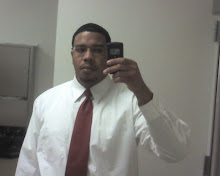Last night, Monday April 27th, I prepared to do my final blog assignment for this class. I had read the instructions for the assignment, and I began reading through my blogs when realized that I haven't done all six interviews. So I started freaking out, (well not really) because I remembered that I didn't post an interview because, at the time, I conducted my interview late and I was told I wouldn't receive credit for it. So I tossed the interview that I conducted with my friend Al, a pharmacy tech at Swedish Covenant Hospital, into a stack of papers about a foot high on my dresser. I spent a good 30-40 minutes looking for the paper I had written the interview down on. When I finally found it, I didn’t feel like blogging any more, so I went to bed. Anyway, I have the paper in front of me now and I’m ready to get my blog on!
As I said before this interview was with a good friend of mine, Al Merginio. He was actually my lab partner for two, maybe three chemistry classes that I took in Daley College. He’s now a pharmacy tech at Swedish Covenant. Since, I only volunteer at Swedish Covenant, this technically makes him my boss. (Even though it feel weird saying that, and he doesn’t really like when I refer to as Mr. Merginio… my bad Al! Lol!) I conducted his interview in the same fashion that I conducted my other five interviews. Enjoy!
JF: How long have you been working as a pharmacy tech?
AM: It’ll be two years in April.
JF: Last time I remember you were working as an optometry tech, why did you change positions?
AM: Before you left (referring to my military deployment) the owner of the Pearle Vision, where I worked was sold to another owner. Once she took over, she got rid of all of the old staff, and hired an entire new one.
JF: So how did you end up in pharmacy?
AM: I was out of work for a while and while I was planning my future, I saw an advertisement for a pharmacy tech class offered by Daley (College). I figured that a lot of the pre-requisites that I was taking for optometry school were similar to pharmacy school. So, I enrolled in the class. Passed the class, then I started looking for work.
JF: How did you get the job at Swedish Covenant?
AM: I was searching for work, and my fiancée, at the time had a friend who worked at the hospital and she got me Debbie’s number (Debbie McQuarters, director of volunteer services at Swedish Covenant Hospital). I called her about volunteering as a (pharmacy) tech and I got hired about a month later.
JF: That’s interesting because I am in pretty much the same situation now. How did you go from being a volunteer to actually getting hired to work in the hospital?
AM: Well, I was volunteering for about 2 months when one of the other techs had quit and another was going away to pharmacy school. Dr. Park (the assistant director of the hospital’s pharmacy) said that he had like my work ethic and told me he would like to hire me full time.
JF: Dr. Park is a great man! Congratulations! What do you like most about your job as a pharmacy tech?
AM: I like the idea of helping others and I know this is going to sound bad, but I like the money most.
JF: That’s completely understandable Now the tough question, what do you like least about being a pharmacy?
AM: Also the money. Mainly, because (you know) the techs do all the work, All the pharmacist do is check the work I’ve done, but they get paid the big money. Also, I don’t like the hours and how my schedule changes every two or three weeks.
JF: What do you mean by that?
AM: Well, the new schedule is printed every two weeks, but it always varies. I work six days a week. Half the days I work morning shift, and the other half I work the evenings. So it’s hard for me to get into a good routine sometimes. But like I said, the money makes it a little easier to manager.
JF: Well. Why don’t you go to pharmacy school and get your Pharm. D so you can make the big money yourself?
AM: I was thinking about that, but I really want to get back into optometry. I’m taking classes now to get my certification to work as an optometrist.
JF: That is interesting to know. You know I’m very much interested in getting a full time position as a pharmacy tech and then maybe a pharmacist myself; do you have any advice for me?
AM: Stay motivated, because if you aren’t motivated then you will lose interest, and you don’t want to be stuck doing something that you aren’t interested in. Focus on your schoolwork, and continue to dress professionally, you look like you belong here and people notice!
JF: Is there anything that you now know that you wish you would have known back then?
AM: Yes, the whole thing about being interested in what you’re doing. I wish I would have known what I was getting myself into when I started working in the pharmacy. Now I’m ready to get out, but I can’t go anywhere now, because I need the money.
